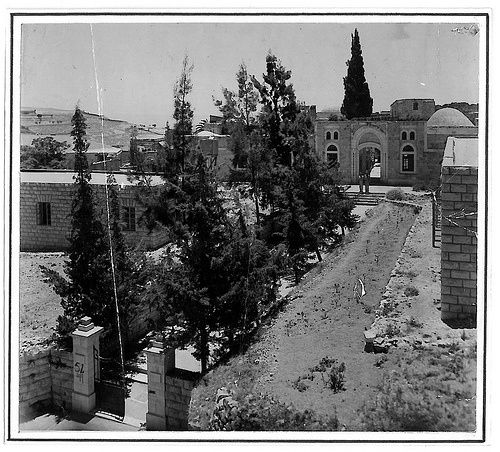[Sufi News Editor' note: Originally founded after a visit to Jerusalem by the 13th century Indian Sufi Saint Baba Farid (aka Fariduddin Ganjshakar) and maintained since Ottoman times as a resthouse for Indian pilgrims, the Zawiya al-Hindiya in Jerusalem has recently been the recipient of a handsome donation on the part of the Indian Foreign Ministry.]
A nearly 700-year-old plot in the heart of Jerusalem that has been flying the Tricolour since 1947 and offering a home to visiting Indian pilgrims has got a fresh lease of life. Foreign minister S.M. Krishna yesterday announced $25,000 (about Rs 13 lakh) in assistance to the Indian Hospice, which has been fighting repeated encroachment attempts and facing financial constraints. Standing on 7000sqm of prime land, the hospice was founded in the 13th century after a visit by Sufi saint Baba Farid. The money Krishna has announced will go towards setting up a Baba Farid Heritage Centre there. The hospice will also be given maintenance funds annually. “We have ensured that the hospice will continue to fly the Indian Tricolour and offer accommodation to Indians visiting Jerusalem,” a foreign ministry source said.
Since 1924, the hospice called Zawiya al-Hindiya has been run as a charitable trust by a family with roots in Saharanpur in Uttar Pradesh. It hosted Indian soldiers during World War II and India-Palestine meetings in recent years. It continues to offer rooms to Indians of all faiths visiting Jerusalem. So far, the hospice has survived with intermittent Indian government and non-government help. But it has been in need of funds for renovation. Its caretakers have, however, spurned offers of help from Israelis and Palestinians for fear of complications that may arise if it loses its Indian character.
Baba Farid, who hailed from Punjab, had visited Jerusalem 700 years ago while on a journey to explore Islam (sic) [Sufi News ed. (most likely) a journey through the Islamic world either during or after his pilgrimage to Mecca]. The then governor of the Ottoman Empire had offered him two rooms to stay. These rooms grew into a holy site for Indian pilgrims over time and expanded into the hospice as it exists today. It is a short walk from Jerusalem’s holiest sites. The hospice has served as a stop for generations of pilgrims who visit Jerusalem on their way back from Haj. During World War II, it served as a camp for the 4th Indian Division of the British Army.
In 2000, it hosted a meeting between then foreign minister Jaswant Singh and Palestinian leader Faisal Husseini. The site was selected after the Israelis reportedly made it inconvenient for the delegations to meet at another spot fixed earlier. The hospice also houses a UN medical centre for Palestinian refugees.
The custodian of the hospice is Sheikh Mohammad Munir Ansari. His father had come from Saharanpur on an invite from the Palestinians. The Ansari family has had to turn to the Indian embassy to prevent encroachments. Their Indian identity has helped them keep away from local politics. The hospice has photographs of Jawaharlal Nehru and Mahatma Gandhi and Khilafat Movement leaders who visited Jerusalem. The hospice went through difficult times when India and Israel did not have diplomatic ties. At that time, non-governmental and individual donations helped it survive.
Officials said things improved after 1992 when India and Israel established diplomatic relations. Then help from New Delhi became regular. Krishna’s funds announcement would keep the hospice safe from people who want to usurp the prime plot it stands on, foreign ministry sources said. Krishna also visited the Yad Vashem Holocaust Memorial and Museum in Jerusalem. He stopped by the cemetery for Indian soldiers, which contains graves of 79 Indian servicemen of World War I.





No comments:
Post a Comment